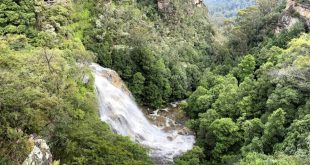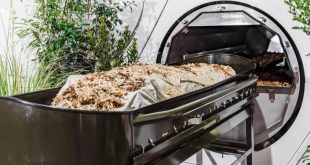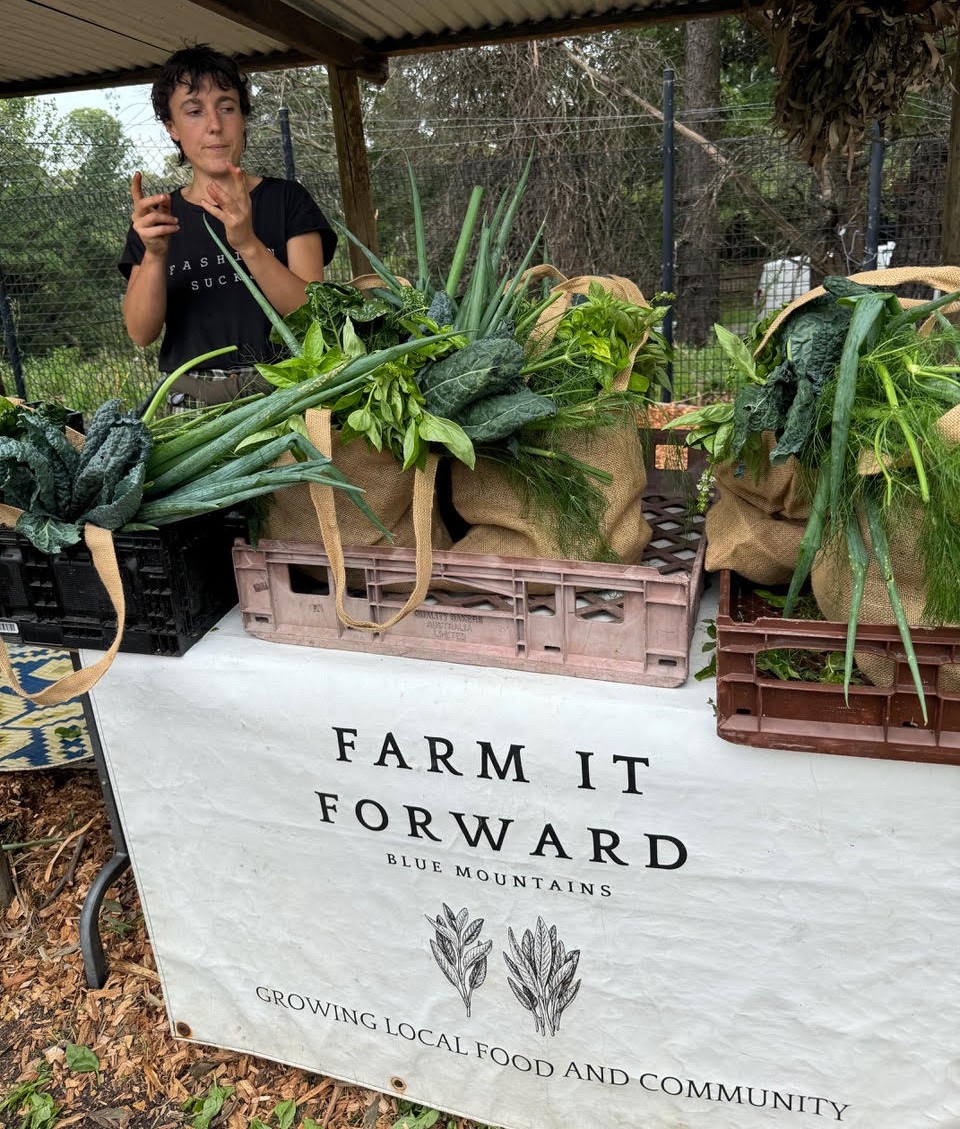
Farm It Forward produce for sale at Katoomba High School (Photo: supplied)
Story by Camille Walsh
As global food insecurity increases, research suggests that the ‘planetary health diet’ is one solution. This calls for a shift towards a plant-based diet and more local food production. Local social enterprise Farm it Forward is showing how this can be done in schoolyards and one backyard after another.
Key Points:
- The number of people suffering acute food insecurity increased from 135 million in 2019 to 345 million in 82 countries by June 2022.
- Farm it Forward is a social enterprise helping to grow local food security and community in the Blue Mountains and could be template for other communities.
- Small, collective actions moving through communities in fractal patterns, have the power to generate near instant, positive change and social transformation.
I first heard about Farm it Forward at a talk being given by Costa Georgiadis of Gardening Australia fame, at the Blue Mountains Writers’ Festival in 2022. Costa was engaging with the audience in his trademark animated way and encouraging us all to live in a more environmentally conscious, sustainable way on this planet. He mentioned Farm it Forward, and (I will sheepishly admit) at the time I didn’t know what or who that was, but my interest was well and truly piqued.
Sometime later, I attended an event at the Planetary Health Centre called Imagining a Healthier Planet. It was at that evening, during the Q&A, that a woman stood up and spoke about the opportunities and challenges being faced by the social enterprise she’d co-founded and, you’ve guessed it, that enterprise was Farm it Forward and the woman, Manu Prigioni.
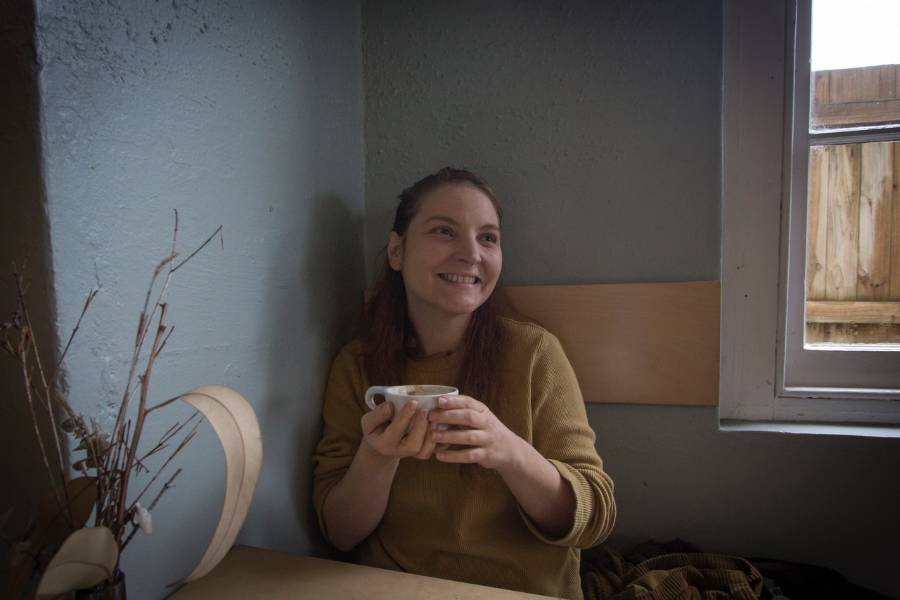
Manu Prigioni enjoying a coffee at Cassiopeia in Katoomba (Photo: Camille Walsh)
What captivated me immediately about Farm it Forward was the simple yet brilliant concept behind the enterprise – Farm it Forward will use a bit of your land, the team will grow food on it, and in return they’ll supply you with some of the fresh, organic produce they cultivate.
There is of course a little more to it than that, but this aspect combined with its broader socio-environmental ethos and motivation is, in today’s world, sheer, necessary genius.
I met with Manu recently on a misty Mountains day in a café in Katoomba to learn a little more…
The facts on Farm It Forward
Farm it Forward has evolved into becoming a registered charity and to provide a little more detail, in the team’s own words, they “facilitate regenerative food production on already available, unused land, using earth friendly community care practices, offering an alternative to further land clearing and over-dependency on centralised, large-scale unsustainable food production.” The team believes that food equity, food sovereignty and food security, strengthens local communities, making them more resilient and prepared for disasters.
In addition to this, Farm it Forward designs socio-environmental care programs for high school-aged young people. In 2024 its team set to work on a grow tunnel at Katoomba High School, working with students, First Nations people and youth peer support organisations, providing transformative learning programs, engaging participants in areas of regenerative food growing, First Nations-led bush regeneration, and finding ways to practically apply and embed the concept of caring for Country in our everyday lives.
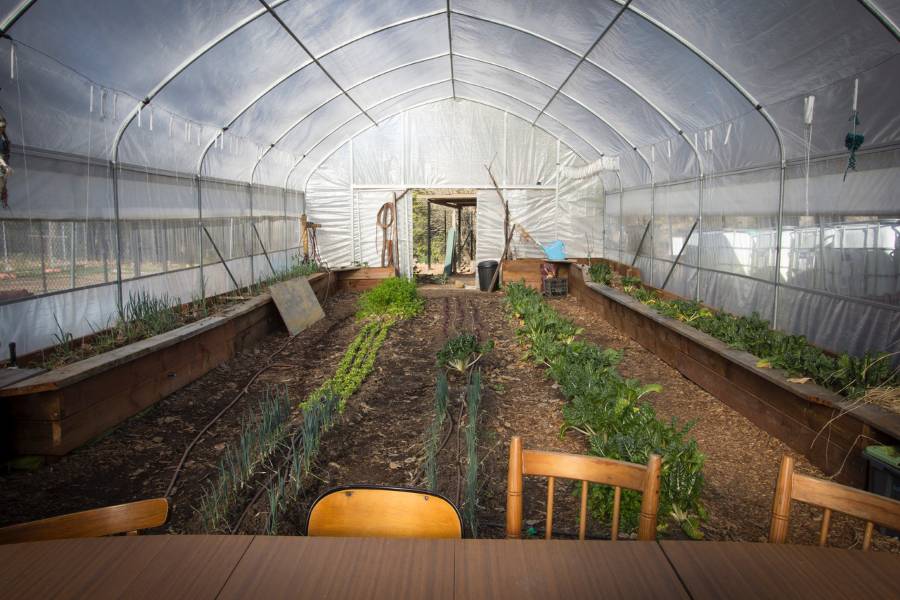
Inside the Farm It Forward grow tunnel at Katoomba High School (Photo: Camille Walsh)
Back to the roots
I was curious to learn where all this began for Manu – what drove her to be a part of setting up an enterprise with co-founders Jack Galluzzi, Olive Awaritefe and Nick Grilanc that is so deeply compassionate and aware, and what motivates her and the current team to keep going. Let’s be honest, these kinds of grass roots ventures aren’t easy. They have heart and they are critical to our future on this planet, but there exists, what at times must feel like, a perpetual uphill battle when it comes to the securing of ongoing funding.
Manu spoke to me about her upbringing, spent mostly in Rome before emigrating to Australia at the age of 19. She speaks fondly of her father, someone she describes as a “deeply caring man” who grew up poor and, perhaps because of this, developed a profound practice of humanitarianism. Manu recalls, even as a young child, sensing the injustice of poverty and questioning why she was fortunate enough to have a roof over her head and food on her table, whereas others were not.
When Manu was just a baby, her five-year old sister passed away just six months after being diagnosed with cancer. As a child and continuing into her adult life, Manu has at times battled with the injustice of such loss and heartbreak. I am filled with admiration for this remarkable woman who has channelled profound personal tragedy into something good. Currently working on a PhD in Social Design, her desire to live in a connected world is put into daily practice. Manu and the team at Farm it Forward are shining examples of advocacy in action.
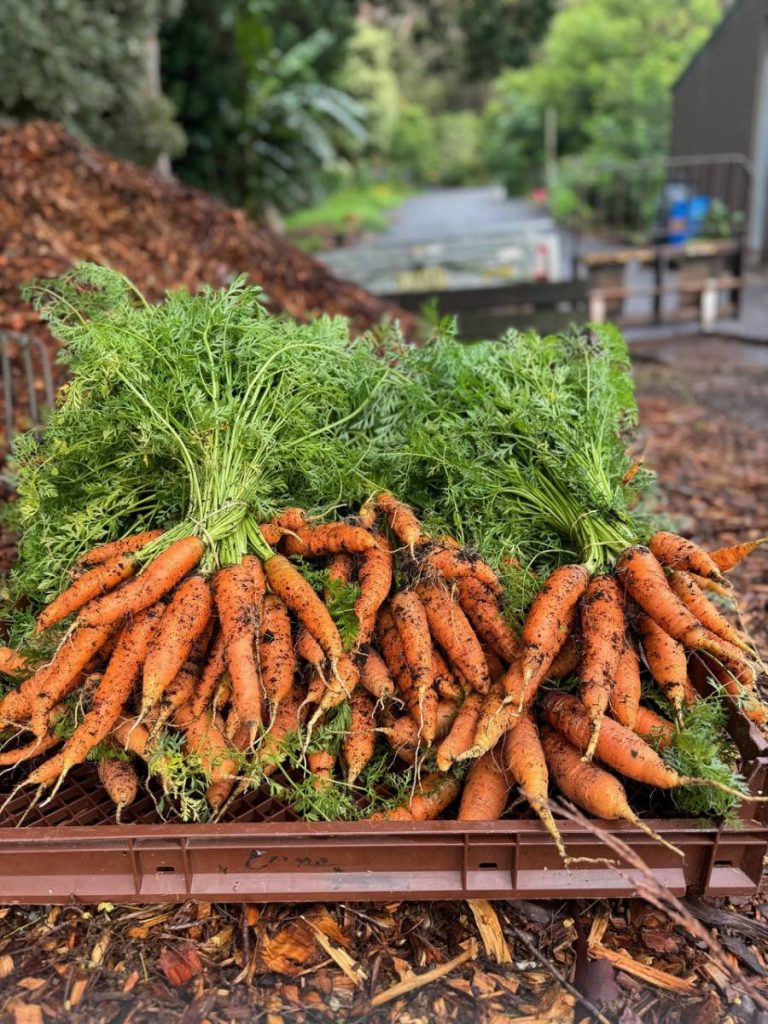
A bumper crop of carrots (Photo: supplied)
As our second coffees arrived, Manu opened up about living as an Autistic person. She was eager to dispel some of the myths surrounding life on the spectrum and society’s haste to engage in generalisations, such as the perception that people living with autism experience isolation or social disconnection.
Manu believes for her the opposite is true and has forged in her a strong sense of solidarity with others and a propensity to look for genuine things that make sense. It’s easy to see how these attributes have been woven into the fabric of Farm it Forward and just how much sense it all makes.
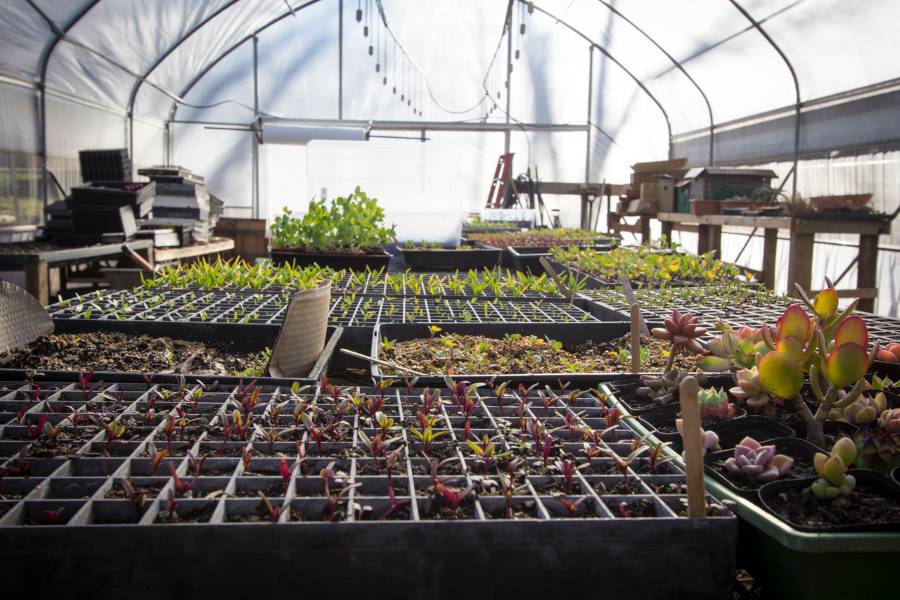
Seedlings aplenty, thriving in the grow tunnel (Photo: Camille Walsh)
Food insecurity
Food security, or rather food insecurity, isn’t a new topic of conversation but perhaps one that has become more firmly embedded in our collective psyches since COVID-19 when, for the first time, many of us faced sparsely stocked supermarket shelves due to pandemic-impacted supply chains.
Then came the war in Ukraine, which continues to significantly affect food supply, and the cost-of-living crisis. We’re now faced with a lack of food certainty that feels uncomfortable, perhaps even frightening.
According to William R. Sutton, Global Lead for Climate Smart Agriculture for the World Bank, the number of people suffering acute food insecurity increased from 135 million in 2019 to 345 million in 82 countries by June 2022.
The food crisis, however, extends back long before COVID and the conflict between Russia and Ukraine: climate change and its impacts are fast becoming the major player. Rising temperatures, flooding and droughts have all severely impacted food production and distribution. Ironically, it’s our very need for food to feed growing populations that also contributes to global warming, with roughly a quarter of greenhouse gas emissions coming from our planet’s food system.
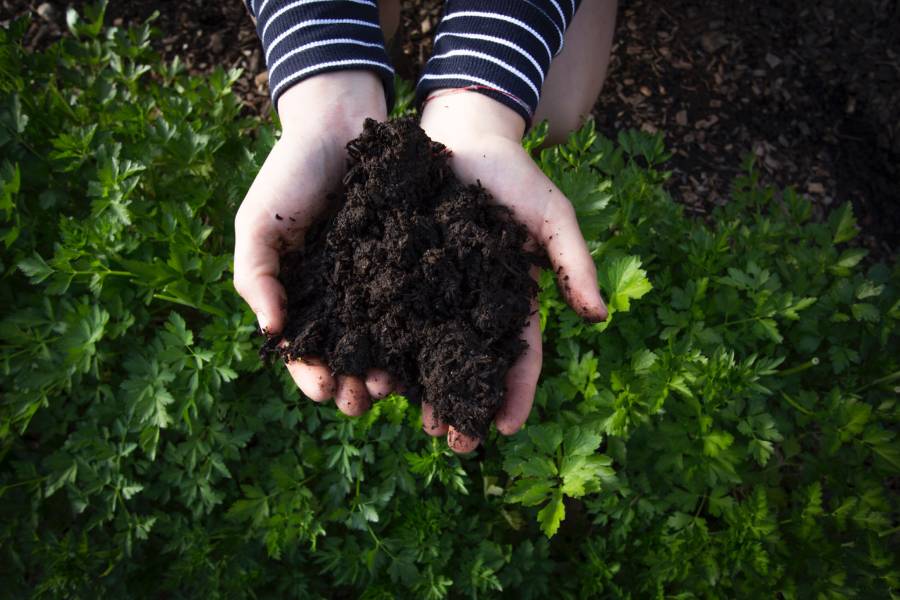
Rich, well cared-for soil is one of the foundations of food security (Photo: Camille Walsh)
Carbon impacts of food production
Agricultural production more than tripled between 1960 and 2015. The outcome of this, initially at least, may have seemed to be a positive one, with the creation of an abundance of low-cost fare which played a significant part in staving off global food shortages. However, as stated in a United Nations Environment Program article from July 2020 discussing the topic of industrial farming, “It is not quite the bargain it seems” with estimates that this farming method is “fundamentally at odds with environmental health” and costs the environment the equivalent of over AUD$4 trillion every year.
In 2022 a University of Sydney study found that food transport alone constitutes 19 percent of global food emissions, equivalent to 6 percent of emissions from all sources. Researchers are urging those of us in wealthy nations who are able, to get in touch with our inner ‘locavore’ – someone who only eats food grown or produced within a 100-mile (161km) radius.
Nutritional ecologist and co-author of this study, Professor David Raubenheimer from the Charles Perkins Centre, said: “Prior to our study, most of the attention in sustainable food research has been on the high emissions associated with animal-derived foods, compared with plants. Our study shows that in addition to shifting towards a plant-based diet, eating locally is ideal, especially in affluent countries.”
There is another way
I remember as a child, wandering through my grandfather’s vegetable garden with its array of organically grown goodness and no pesticides in sight. There was a time when ‘organic’ wasn’t a proclamation that needed to be made because it was just the way things were done. Creating and tending to your own food garden however, for various reasons, is not an option for everyone.
Manu spoke to me about how Farm it Forward has observed and listened to the needs of its local community, with a focus on the provision of healthy, affordable produce that adheres to an ethos of sustainability and food security. What they’ve created is a template that can serve other communities, throughout Australia and the world. For us locally, we reap the benefits of not only the food they produce but the immeasurably positive impacts their programs have for our youth, and the building of a socially cohesive, compassionate and resilient community for us all.
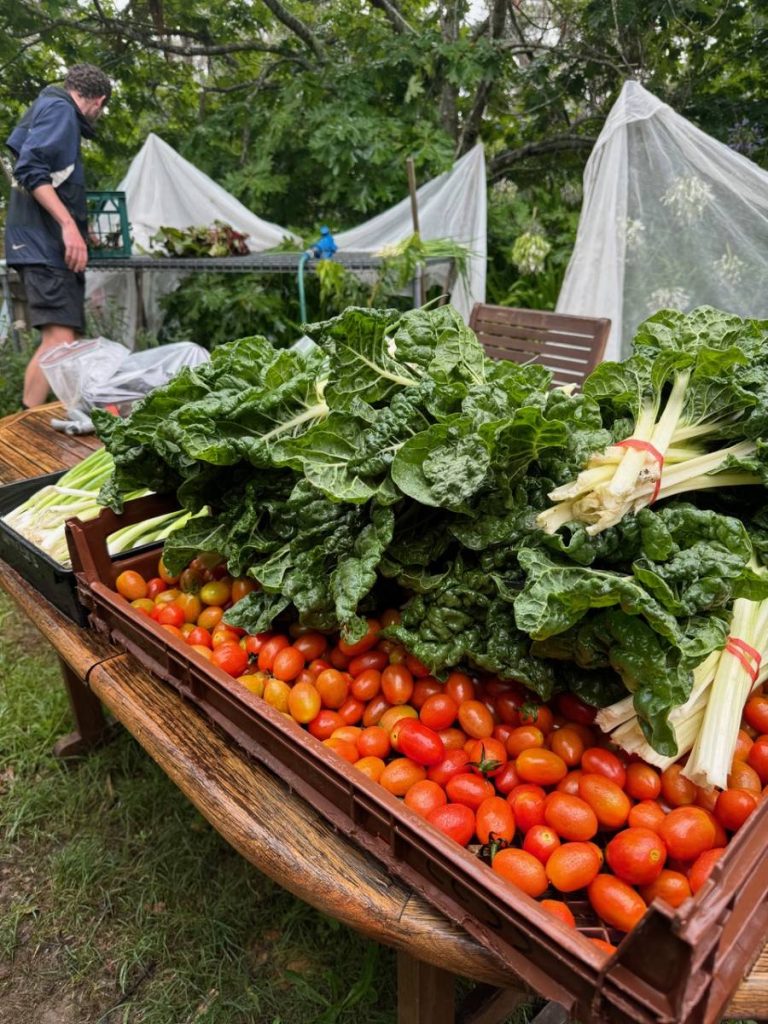
A bountiful harvest, headed for local dinner tables (Photo: supplied)
Professor Karen O’Brien, from the Department of Sociology and Human Geography at the University of Oslo, Norway, is someone Manu cites as a major influence. Professor O’Brien’s research into the human and social dimensions of climate change is packing a punch worldwide and her work around quantum social change is, thankfully, reaching a global audience.
She invites us to consider the necessity of interconnection based on values like equity, dignity, compassion, humility and love and how they should be applied to all of life; to deepen our awareness of fractal patterns that appear in nature (spirals, beehives, rivers, tree branches, leaves…) and for us to understand the relationship of our own individual actions on the whole.
In 2023, Manu presented a talk at TEDx Katoomba titled ‘Growing Communities’. I highly recommend a listen, if you’ve not done so already. In that talk, Manu speaks of the opportunities that Farm it Forward continues to present, for us to redesign the way we care for land, grow our food and look after one another. She encourages us to become ‘entangled agents of social change’ and shares her perspective that entanglement isn’t a messy thing, rather it’s beautiful, strong and resilient.
Manu’s TedX talk in Katoomba, 2023
Manu reminds us that “small, collective actions moving through communities in fractal patterns, have the power to generate near instant, positive change and social transformation.”
Locally grown & enjoyed
Farm it Forward’s actions include running fresh food programs selling vegetable boxes from the grow tunnel at Katoomba High School to the local community. The team focuses on strengthening collaboration with other local regenerative growers, to increase impact and volume, and to expand their veggie box and nature-based, mental health programs to other interested local public high schools, if funding permits.
A lack of ongoing funding, however, is an all-too-common obstacle to the survival of programs like those being implemented by Farm it Forward. In her response to the 2025 Department of Agriculture’s Food Security Strategy Discussion Paper, Manu writes:
Civic fresh food initiatives have been proliferating in Australia, but are not being adequately supported with regular federal funding (as opposed to sporadic, project-based small grant state funding), incentives and infrastructure to scale their impact. I support calls for a National Food Policy with cross-sector engagement between health, education, and agriculture. With adequate policy, funding and infrastructure, retro-fitting our public high schools with an embedded civic fresh food initiative managing the growing, selling and procurement of regeneratively grown fresh food would be one highly efficient way to tackle food and nutrition insecurity as well as a myriad of social, mental and physical health issues present in Australia. Embedded fresh food initiatives provide access to a larger network of local fresh food growers, promoting direct sales from local primary producers, making healthy, nutrient-dense fresh food more affordable due to a lack of mark-ups, and introducing a new, financially viable, socially connected employment pathway – that of civic fresh food growing – to young people, ie the next generation of fresh food growers.
As with every obstacle comes an opportunity, and to stave off feelings of overwhelm in what can sometimes feel like a disintegrating world, this is where we all come in. We can do what we can, even if it feels small. We can be a part of a movement that encompasses individual, collective and systems change.
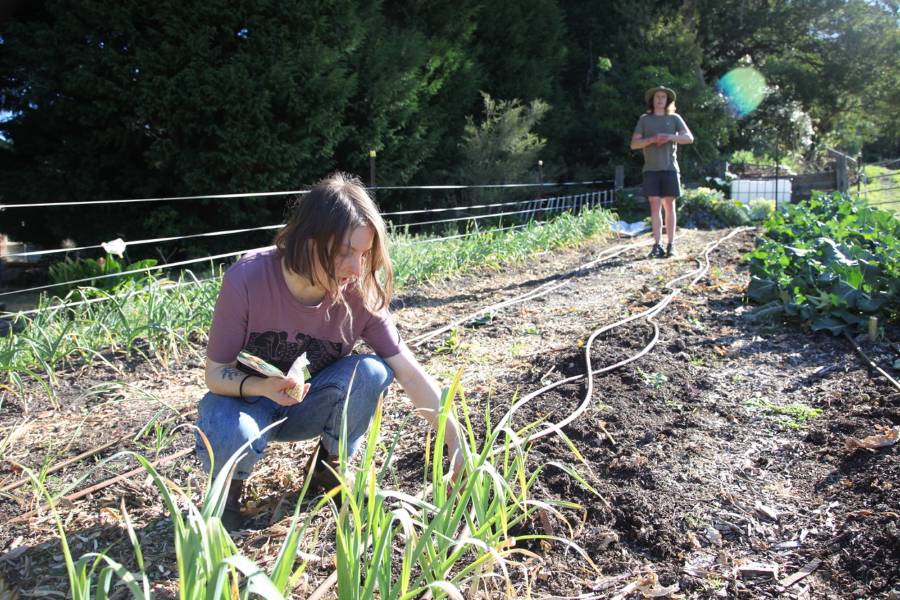
A Farm It Forward backyard growing plot in the mid-Mountains (Photo: supplied)
We can support incredible initiatives like Farm it Forward, try our hand at growing a little bit of food, be mindful of stocking our pantries with produce less travelled, start composting, start conversations, learn more about Indigenous foods and practices, connect with others, connect with Country.
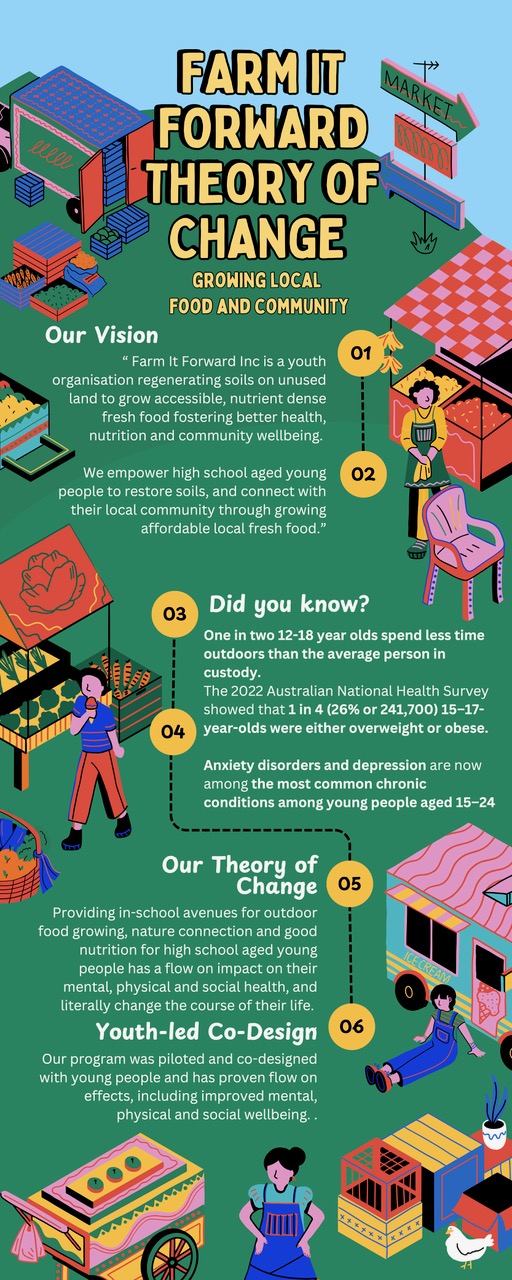
Take Action:
- Keep up to date, find out how you can get involved and support Farm it Forward here: Farm it Forward and here: Farm it Forward on Instagram
- Attend the inaugural Blue Mountains Food Security Fair on Saturday 18 October at the Planetary Health Centre. Learn more and register here https://events.humanitix.com/food-security-fair-or-planetary-health-initiative
- Learn more about the Planetary Health Diet here https://eatforum.org/eat-lancet-commission/the-planetary-health-diet-and-you/



